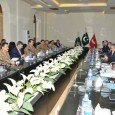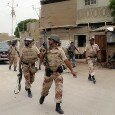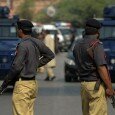By Mirza Khurram Shahzad –
The ‘infiltration’ of militants in Pakistan’s security forces demands the strictest screening mechanisms
Al-Qaeda and Taliban led militants attacked Pakistan Navy dockyard in Karachi on country’s defence day, September 6, killing at least one sailor and besieging the sensitive installations for hours.
Later, al-Qaeda’s new South Asia branch claimed responsibility for the attack saying former Navy officers helped them for the assault. Next day, security agencies arrested at least three serving Navy officers for being hand-in-glove with militants who attacked the dockyard.
But surprisingly, the authorities concealed the information about the attack for long and made it public at least two days after the incident. According to a report authored very recently, a sub-lieutenant of Pakistan Navy, Owais Jakhrani, who was sacked from Navy, planned the attack on the Pakistan Navy dockyard.
Owais Jakhrani, who was killed in the terror strike, was son of a serving senior officer of Karachi police. The report says that Jakhrani’s militant thoughts were detected and he was fired from the service several months before the attack but he still succeeded to carry it out.
The officials believe that Jakhrani also went to Afghanistan to receive terror training. But this was not the first attack against Pakistan Navy which was carried out with the help of insiders.
In 2011, Taliban militants attacked the Mehran naval aviation base in Karachi which lasted for 18 hours and killed 10 people, besides causing heavy infrastructural losses, including the destruction of navy’s surveillance aircrafts.
In May 2011, the then serving Brigadier Ali Khan was arrested for having links with banned organization Hizb-ut-Tahrir. Khan was serving at the general headquarters of Pakistani army in Rawalpindi at the time of his arrest on 6 May 2011. From his prison cell, Khan had also released a six-page manifesto calling for Pakistan to sever its anti-terrorism alliance with the United States.
Earlier in 2009, Taliban gunmen wearing army uniforms attacked Pakistan’s army headquarters in Rawalpindi. They captured a part of the military complex for more than 24 hours and the area could be cleared only after a commando operation that led to killing of around a dozen men, including two senior officers.
That attack was also carried out with the support of ex-army men, who led the attackers deep inside the GHQ. The attempt however was thwarted by the highly professional counter action by the soldiers.
The official disclosure
The infiltration of militants in Pakistan’s security forces is a secret no longer. Besides all these major terrorist acts, militants have carried out dozens of smaller attempts on the installations countrywide by exploring their contacts inside the security forces.
Till now, the authorities had been denying the fact that the militants had made inroads in the ranks and files of security forces and reacted strongly in 2009 when it was first reported that the militants had built a good strength of their sympathisers and associates in Navy, Army and Airforce. And that the Mehran base attack was launched with the internal help of Navy officials.
But after the fresh attack on the dockyard, the government had to admit officially about the infiltration of militants and the role of ‘insiders’ in the attack. “We cannot rule out the inside help in this attack because without it the miscreants could not breach security,” Khawaja Muhammad Asif, Federal Minister for Defence told the Parliament after the attack. Asif said that security forces seized pistols, Kalashnikov rifles, walkie talkies, suicide jackets, handcuffs and religious books from the militants. One of the attackers had connections in North Waziristan, he added.
Al-Qaeda’s aims
Al-Qaeda’s sub-continent spokesman Usama Mahmood, while claiming the responsibility for the attack said they wanted to capture the naval vessel and attack a U.S. warship. “We carried out the attack on Pakistan Navy with the help of our Mujahid brothers from Pakistan Navy. Our aim was to use Pakistan Navy dockyard to attack the U.S. vessel to teach them a lesson,” he said in statement sent to media.
It was the first attack claimed by the terror network’s new wing, whose creation was announced by Chief Ayman Al-Zawahiri, days before the Karachi attack. A senior security official, while requesting anonymity, confirmed that all major forces Army, Navy, Airforce and police were facing threat from within their ranks as militants had succeeded to dig in to a little extent.
“Though there is a continuous process of scrutiny to avoid any infiltration, still many members of the forces have been found in contact with the militants and several of them have been detained as well,” he said.
A naval Spokesman, however, said that the investigations are still underway and it is premature to suggest that the dockyard attack or any other attempt on the security forces’ installations were an inside job.
The tracking system
Imtiaz Gul, a senior security analyst, says that the top officials were aware of weakness in surveillance of military officers dismissed for extremism. “They don’t have a tracking system for officers who are dismissed or asked to leave the service because of their radical views,” he said while commenting on the report about the involvement of ex-soldiers in attacks on security forces.
Sajjad Tarakzai, a senior journalist who has worked on security and militancy issues since 1990s and has reported for several international and national news organisations, says that anti-American feelings and Pakistani forces’ alliance with the U.S. and NATO have been a main reason for the soldiers to fall in the trap of the militants.
“Militant groups exploit the anti-American feelings in the armed forces, they always search channels to use it,” he added. However the forces, Tarakzai said had a strong mechanism to monitor their soldiers and had largely failed such efforts of the militants to build a strong support except a few unsuccessful attacks.
But a senior security official, who did not want to give his name, said the armed forces needed to tighten their check on their own members to reduce even minor chances of infiltration. “We have so far worked very well to root out the suspected elements from within the forces. But we need to monitor it more closely and regularly, though our internal defence system is self sufficient to knock out such elements,” he said.
 The writer is senior journalist based in Islamabad. He works for AFP
The writer is senior journalist based in Islamabad. He works for AFP






























































































